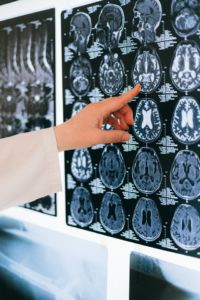
You’ve been in a car accident. Now what? Injuries from car accidents range from life-threatening to mild. Sometimes they are apparent at the scene of the crash, but often symptoms are delayed. Delayed pain happens because the initial adrenaline burst during the accident acts as a pain reliever. Some types of pain are delayed even after the adrenaline wears off because inflammation hasn’t had time to form. It’s essential to seek medical attention right away after an accident, even if you don’t think you’ve been injured. Here’s what you should know about common car accident-related injuries.
Whiplash
Whiplash typically happens to drivers who’ve been hit from behind. Even “fender benders” can cause whiplash injuries. Whiplash happens when your vehicle’s speed or trajectory changes suddenly. Your head and neck will whip back and forward. This causes extensive soft tissue injury to the tendons and ligaments and can even affect the curve of your cervical spine.
Whiplash injuries are one of the worst offenders when it comes to delayed symptoms. Headaches, neck pain, and other signs often don’t show up until one or two weeks after the accident. Since whiplash can cause long-term pain and require months of treatment sessions, it’s important to be evaluated for it right away. Your accident claim process will go much smoother if your injuries are documented soon after the accident. Many whiplash victims hire a personal injury attorney to ensure they get the compensation they deserve.
Treatment for whiplash includes chiropractic adjustment, rehabilitation exercises, spinal decompression, and certain types of injections to relieve inflammation and pain. The goal of treatment is to restore proper alignment to the spine and heal traumatized tissues. Some muscles and tendons may be shortened due to changes in the spinal curve, while others will be overstretched. Exercises aim to correct this. With consistent adherence to a treatment plan, it is possible to relieve pain and restore range of motion.
Concussion
A severe concussion causing loss of consciousness will usually be evident at the accident scene or very soon after. Other symptoms can be delayed. If you’ve been in any kind of an accident, you should be evaluated for a concussion immediately. Concussions from car accidents happen in two ways. They can be the result of hitting your head on a hard object in the car or extreme motion that causes your brain to hit the inside of your skull. Often people with whiplash experience this second type of concussion.
Head injury symptoms include nausea and vomiting, memory loss, trouble thinking or speaking, loss of coordination, fainting, or losing consciousness. A CT scan will rule out a life-threatening injury like bleeding on the brain and may show the extent of your concussion injuries. It’s a good idea to be evaluated by a neurologist if you’ve had a concussion. Head injuries can cause many short and long-term symptoms, including mental health problems and personality changes. Having your injuries documented will give you a legal leg up if these symptoms affect your ability to make a living or perform daily tasks.
Internal Injuries
It may seem that severe internal injuries would be noticeable immediately, but that isn’t always the case. Wearing your seat belt may save your life in a serious accident, but it can also cause injury, especially if it isn’t worn correctly. The bottom strap of the seat belt should lay flat on the lap. If it’s across the belly, it can cause bruising or internal injuries during an accident. If you don’t wear a seatbelt, the steering wheel can cause even worse internal injuries.
Accident victims sometimes walk away from the scene not knowing that they’ve sustained internal injuries. These injuries can worsen over days or weeks, and by the time the patient seeks treatment, it may be difficult or impossible to fix the problem. This is just one more reason why a thorough medical evaluation is necessary after an accident.
You should also try to be aware of your body in the days following an accident and don’t hesitate to see a doctor about seemingly minor symptoms like headache, back or belly pain. Your doctor could have missed something during their evaluation. Don’t wait until symptoms get worse to seek help.
Musculoskeletal Trauma
Broken bones will be apparent immediately and can usually be treated quickly and effectively, though healing will take time. Injuries to soft tissues can begin hurting days after the accident and may become debilitating if not treated. There are several common musculoskeletal injuries associated with accidents. These include:
- Ruptured or bulging discs
- Muscle tears or strains
- Damage to tendons or ligaments
- Joint damage, often to knees, wrists, or hips
- Sciatica
- Damage to nerves or compressed nerves
These injuries may affect your ability to work and do daily tasks. Prompt treatment increases your chances of a full recovery. Your provider should thoroughly evaluate you and set up a treatment plan. You may need a combination of rehabilitation, chiropractic care, injections, and at-home care. Treatment plans usually call for frequent treatment (more than once a week) for the first several weeks, then taper off to less frequent treatments. It’s important to complete your treatment plan. Studies have shown that patients with back pain who stop treatment plans early are less likely to experience long-term relief.
Treatment for Car Accident Injuries in Houston
At Vanguard Spine & Sport, our chiropractors, physical therapists, and nurse practitioners will work together on your treatment plan. This multifaceted approach leads to better patient outcomes, and seeing all your providers in one location is convenient. Our office staff has experience dealing with insurance claims and will provide a smooth, hassle-free experience. We keep a list of attorneys who have gotten results for our clients in the past and refer them to new clients.
Schedule a consultation today to get started with your healing journey.





